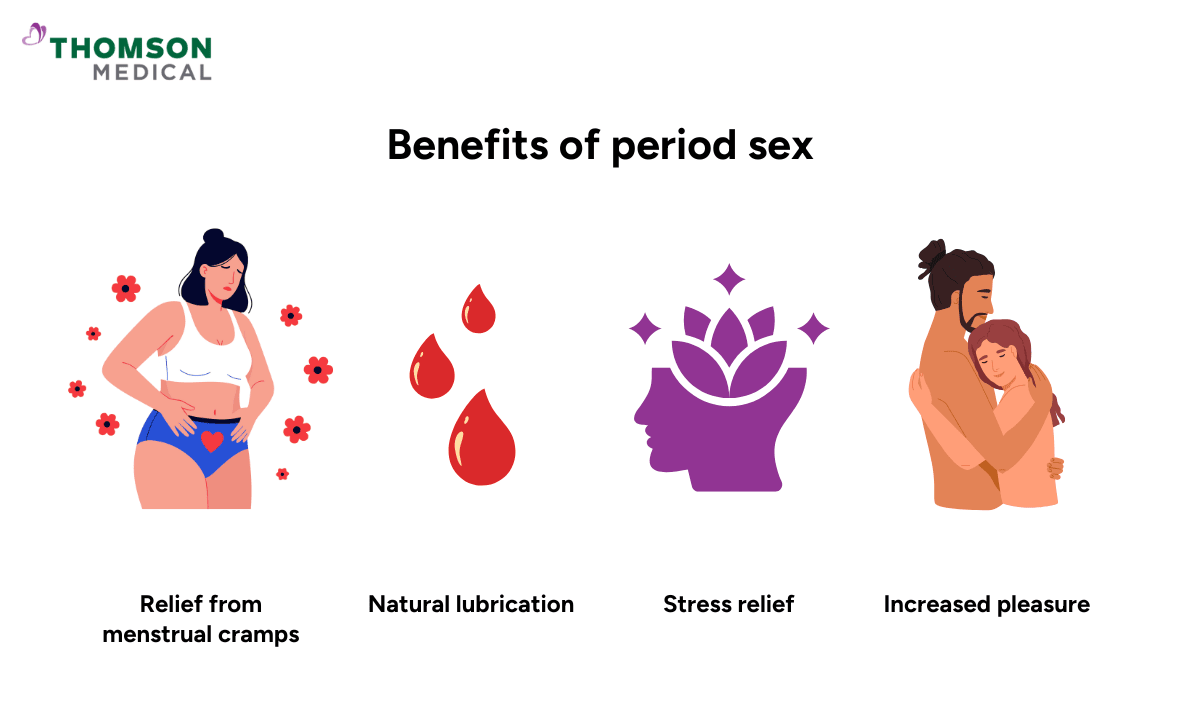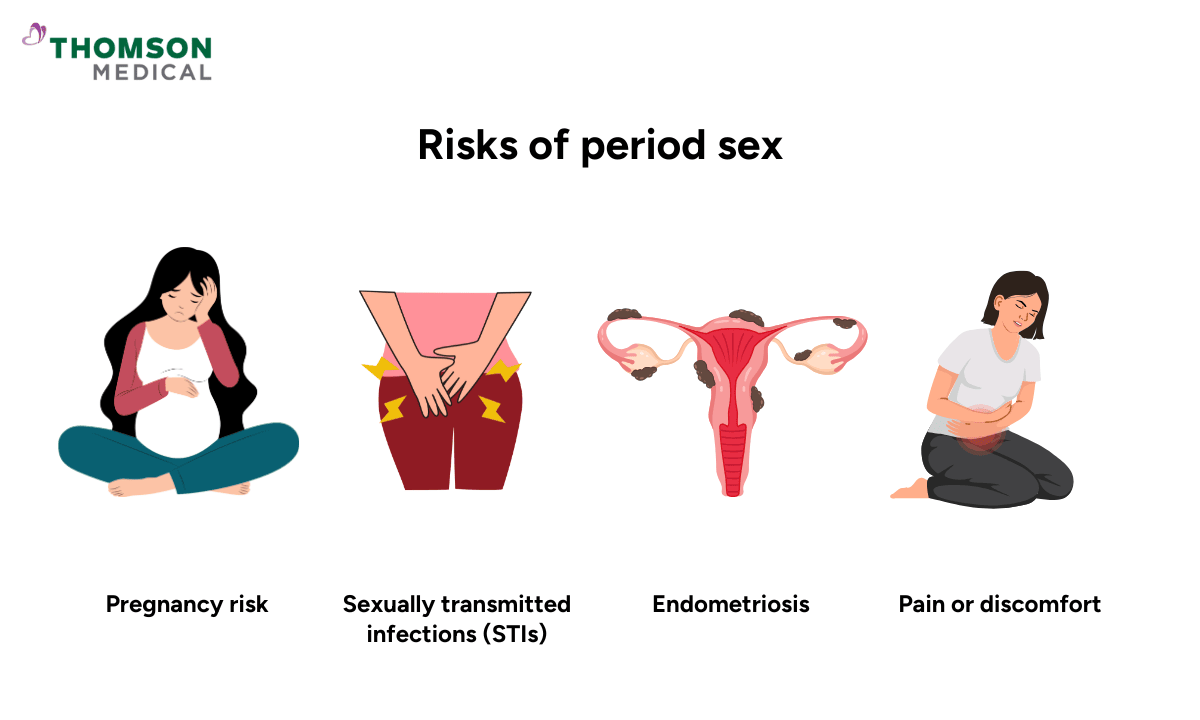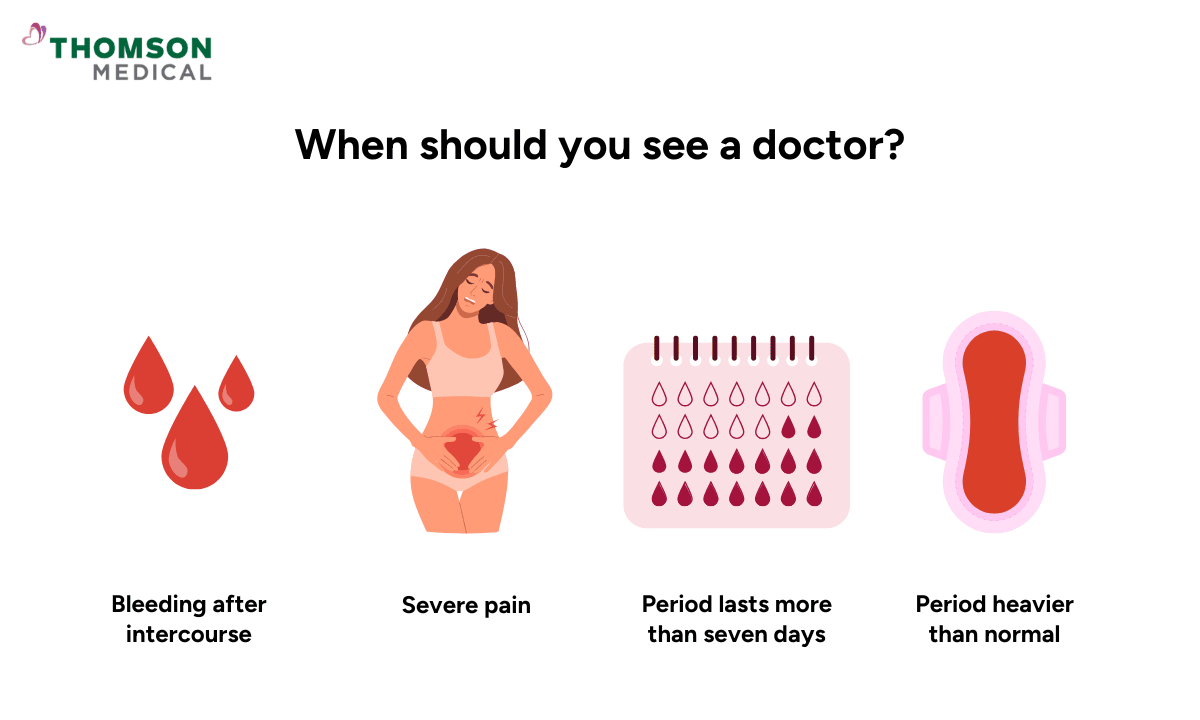It’s that time of the month again, and you’re wondering whether you’ll be able to be intimate with your partner over the coming days. It’s a question that many women hesitate to ask, even though it’s more common than you might think.
The truth is, curiosity about intimacy during menstruation is completely normal, and wanting clear answers doesn’t make you an oddball. Although this topic may feel taboo, understanding the facts of period sex can help you make informed decisions about your sexual health.
Is it safe to have sexual intercourse during your period?
For most women, having sexual intercourse during their period is actually safe. These intimate activities might even help to ease your cramps or lift your mood due to the release of endorphins, which are natural “feel-good” hormones. However, it’s important to be aware of a few potential risks associated with period sex to protect your sexual health.
What are the benefits of having intercourse during your period?

While it might not appeal to everyone, there are some positive effects you may experience from having period sex. These include:
Relief from menstrual cramps:
Orgasms release endorphins, which act as natural painkillers and help reduce menstrual cramps or headaches.
Natural lubrication:
Menstrual blood adds moisture, which can make sexual intercourse feel smoother and more comfortable.
Stress relief:
Sexual activity can help reduce stress and promote better sleep.
Increased pleasure:
Increased blood flow to the pelvic area during menstruation can make the body more sensitive, which may lead to stronger orgasms.
Possible immune benefits:
A study suggests sexual activity may help strengthen the immune system, although more research is needed.
For questions about sexual activity during menstruation, or if you're unsure if it's right for you, request an appointment with Thomson Medical. Our specialist can help provide tailored advice to you on the benefits and potential risks of having period sex.
What are the potential risks of having sexual intercourse during your period?

Although period sex is generally safe, there are a few potential risks that you need to be aware of, which include:
Pregnancy risk:
You can still get pregnant if you have sexual intercourse during your period, especially if your menstrual cycle is short or irregular.
Sperm can live inside your body for up to five days, so if you ovulate soon after your period, pregnancy can occur. Using contraception is the best way to prevent this.
Sexually transmitted infections (STIs):
Menstrual blood can make it easier for infections like HIV or hepatitis to spread. Using condoms or dental dams during sexual intercourse can provide protection.
Other infections:
The chance of getting urinary tract infections (UTIs) or bacterial vaginosis may slightly increase during your mentsrual period. Practising good hygiene and using protection can help reduce this risk.
Endometriosis:
Some research suggests a possible link between sexual activity during menstruation and an increased risk for endometriosis (a condition where uterine tissue grows outside the uterus) but more studies are needed to confirm this connection.
Pain or discomfort:
Some women may feel cramping or tenderness during period sex, especially those with endometriosis. If you feel pain, stop and talk to a doctor.
Period sex is generally safe for most women, but you should always use condoms to prevent infections and pregnancy. Additionally, keeping a towel nearby and washing up before and after sexual intercourse can help to maintain hygiene.
Our gynaecologist
Loading...
Can you become pregnant from period sex?
Yes, it’s possible for you to become pregnant from period sex, although the chances are lower compared to other times in your cycle. This happens depending on how long sperm can survive and on timing of your ovulation.
When you have your period, your body is shedding the uterus (lining of the womb). Most people think it’s a “safe time” because ovulation (when your ovary releases an egg) usually happens later in the cycle. However, not everyone has the same cycle length or timing.
Here’s what can make pregnancy possible:
Sperm survival:
Sperm can survive in the woman's body for up to five days. If you have intercourse near the end of your period, and ovulation happens soon after, the sperm may still be alive and ready to fertilise the egg.
Shorter menstrual cycles:
If you have a short menstrual cycle (less than 28 days), you may release an egg soon after bleeding stops, which creates the possibility for conception.
Irregular ovulation:
Your ovulation doesn’t always happen on the same day each month.
Factors like stress, illness, or hormonal changes can cause it to happen earlier or later than usual.
Late-period sex:
If you have unprotected sexual activity in the last days of your period, sperm could still be present when the egg is released.
If you want to avoid pregnancy, continue using contraception even during menstruation. For a personalised consultation on the most effective contraception method for you, request an appointment with our specialist at Thomson Medical.
When should you see a doctor?

Although having sexual intercourse during your period is generally safe, you should see a doctor if you experience any of the following:
Bleeding after sexual intercourse or between periods
Severe pain during or after intercourse
Periods that last more than seven days
Abnormal menstruation that is heavier than normal
These symptoms may not always mean something serious, but it’s important to get checked. Early medical advice helps identify any underlying issues and maintain good reproductive health.
FAQ
Is period sex safe without a condom?
No, it is not safe. Having sexual intercourse during your period without a condom increases the risk of pregnancy and sexually transmitted infections (STIs). Blood can carry infections more easily, and sperm can survive for several days, so pregnancy is still possible.
Can period sex cause infections?
Yes. Menstrual blood can increase the risk of infection, such as yeast infections and bacterial vaginosis. It can also make some STIs like HIV, hepatitis, or syphilis easier to transmit.
Is it safe for my partner to ejaculate inside me during my period?
Sex during your period is possible, but it does not prevent pregnancy. Use protection if you want to avoid getting pregnant. Period sex also does not protect against STIs.
Is it normal to feel more aroused during your period?
Yes, it is normal. Hormonal changes and increased blood flow in the pelvic area can make you more sensitive and boost libido. Feeling less worried about pregnancy can also contribute to increased sexual desire.
Does sexual intercourse make your period heavier or shorter?
No, sexual intercourse does not affect your overall period flow, but orgasms can temporarily increase the flow and potentially shorten the total duration of your period.
What positions are most comfortable during period sex?
Positions where you are in control, such as woman-on-top (cowgirl), are often most comfortable. The missionary position with a slightly raised pelvis or doggy-style can also reduce pressure on your abdomen.
Can intercourse relieve cramps?
Yes. Orgasms during sexual intercourse release endorphins and cause uterine contractions that can ease cramps. Sexual activity may also help reduce headaches associated with your period.
The information provided is intended for general guidance only and should not be considered medical advice. For personalised recommendations and tailored advice based on your unique situations, please consult a specialist at Thomson Medical. Request an appointment with Thomson Medical today.
Reference:
Cetera, G. E., Punzi, M. C., Merli, C. E. M., & Vercellini, P. (2025). Analyzing the association between menstrual coitus and endometriosis’ pathogenesis: A narrative review. Women S Health, 21. https://doi.org/10.1177/17455057241305072
Kölle, S. (2022). Sperm‐oviduct interactions: Key factors for sperm survival and maintenance of sperm fertilizing capacity. Andrology, 10(5), 837–843. https://doi.org/10.1111/andr.13179
Watson, S. (2024, April 18). Endorphins: The brain’s natural pain reliever. Harvard Health. https://www.health.harvard.edu/mind-and-mood/endorphins-the-brains-natural-pain-reliever
For more information, contact us:
Thomson Specialists (Women's Health)
Thomson Women's Clinic (TWC)
- Novena:
6592 6686 (Call), 8611 8986 (WA) - Bukit Batok:
6569 0668 (Call), 8686 3525 (WA) - Choa Chu Kang:
6893 1227 (Call), 8282 1796 (WA) Jurong:
6262 8588 (Call), 6262 8588 (WA)- Katong (female doctor):
6970 2272 (Call), 8611 9020 (WA) - Punggol:
6243 6843 (Call), 8811 0328 (WA) - Sembawang: 6753 5228
- Sengkang: 6388 8125
- Serangoon (female doctor): 6382 3313
- Tampines: 6857 6266
- Tiong Bahru: 6276 1525
